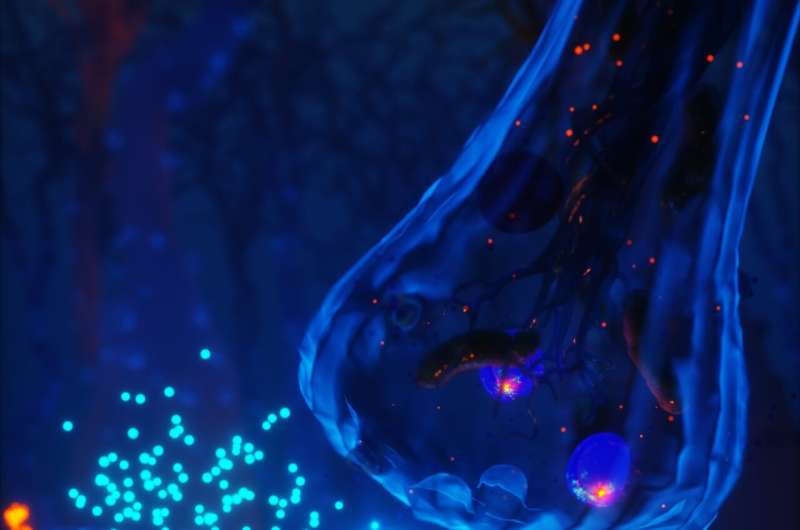This article has been reviewed according to Science X's editorial process and policies. Editors have highlighted the following attributes while ensuring the content's credibility:
fact-checked
peer-reviewed publication
trusted source
proofread
Insulin-like hormones critical for brain plasticity, research suggests

Research from the Max Planck Florida Institute for Neuroscience has identified a mechanism through which insulin-like growth factors facilitate brain plasticity.
The insulin superfamily of hormones, including insulin, insulin-like growth factor 1 (IGF1), and insulin-like growth factor 2 (IGF2), play a crucial role not only in regulating blood sugar, metabolism, and growth, but also in healthy brain development and function, including learning and memory.
These hormones can enter the brain through the bloodstream from the liver or can be synthesized directly in neurons and glial cells within the brain. They bind to receptors, including the IGF1-receptor, activating signals that modulate neuron growth and activity. Disruption of this signaling pathway is involved in cognitive decline and diseases such as Alzheimer's.
To understand how IGF1 and IGF2 promote brain health, scientists investigated the activation of this signaling pathway in the hippocampus, an area of the brain critical for learning and memory. Specifically, they wanted to explore whether IGF signaling was active during synaptic plasticity, the cellular process that strengthens connections between neurons during memory formation and protects against cognitive decline. The research is published in the journal Science Advances.
To do this, Max Planck scientists developed a biosensor that detected when the IGF1-Receptor was active, allowing them to visualize the activity of the signaling pathway involved in plasticity. When a synapse was undergoing plasticity, the scientists observed that the IGF1-Receptor was robustly activated in the strengthening synapse and nearby synapses. This receptor activation was critical for synaptic growth and strengthening during plasticity. However, where the IGF that activates the receptor was coming from was unknown.
Lead researcher and first author of the scientific publication, Dr. Xun Tu, however, described how being able to visualize the receptor activation during plasticity gave them a clue. "The fact that the activation of the IGF-receptor was localized near the synapse undergoing plasticity suggested that IGF1 or IGF2 might be produced in hippocampal neurons and locally released during plasticity," she explained.
To explore this hypothesis, the scientists tested whether IGF1 and IGF2 were produced and could be released from hippocampal neurons.
Interestingly, they found a region-specific difference in the production of IGF1 and IGF2. One group of neurons in the hippocampus, CA1 neurons, produced IGF1; another group, CA3 neurons, produced IGF2. When either CA1 or CA3 neurons were activated in a way that mimicked synaptic plasticity, IGF wasreleased. Importantly, when the scientists disrupted the ability of the neurons to produce IGF, the activation of the IGF1-Receptor during plasticity and synaptic growth and strengthening was blocked.
Senior author on the publication and Max Planck Scientific Director, Dr. Ryohei Yasuda, summarized the findings. "This work reveals a local, autocrine mechanism in neurons that is critical for brain plasticity. When a synapse undergoes plasticity, IGF is released locally to activate the IGF1-Receptor on the same neuron. Disrupting this mechanism impairs the plasticity, highlighting its critical role in maintaining cognitive health."
This discovery of this new mechanism sheds light on how memories are encoded in the brain and highlights the importance of further study on the insulin superfamily of hormones in the brain. The scientists hope that understanding the mechanism through which IGF hormones facilitate brain plasticity, will lead to research into whether targeting this signaling pathway could prevent cognitive decline and combat diseases like Alzheimer's.
More information: Xun Tu et al, Local autocrine plasticity signaling in single dendritic spines by insulin-like growth factors, Science Advances (2023). DOI: 10.1126/sciadv.adg0666




















